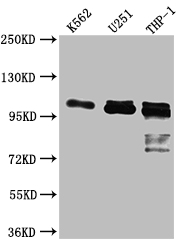
Western Blot Positive WB detected in: K562 whole cell lysate, U-251 whole cell lysate, THP-1 whole cell lysate All lanes: ITCH antibody at 1:1000 Secondary Goat polyclonal to rabbit IgG at 1/50000 dilution Predicted band size: 103, 99, 87 kDa Observed band size: 103 kDa
ITCH Recombinant Monoclonal Antibody
CSB-RA587302A0HU
ApplicationsWestern Blot, ELISA
Product group Antibodies
ReactivityHuman
TargetITCH
Overview
- SupplierCusabio
- Product NameITCH Recombinant Monoclonal Antibody
- Delivery Days Customer20
- ApplicationsWestern Blot, ELISA
- CertificationResearch Use Only
- ClonalityMonoclonal
- Clone ID9C3
- ConjugateUnconjugated
- Gene ID83737
- Target nameITCH
- Target descriptionitchy E3 ubiquitin protein ligase
- Target synonymsADMFD; AIF4; AIP4; atrophin-1 interacting protein 4; E3 ubiquitin-protein ligase Itchy homolog; HECT-type E3 ubiquitin transferase Itchy homolog; itchy E3 ubiquitin protein ligase homolog; NAPP1; NFE2-associated polypeptide 1
- IsotypeIgG
- Protein IDQ96J02
- Protein NameE3 ubiquitin-protein ligase Itchy homolog
- Scientific DescriptionActs as an E3 ubiquitin-protein ligase which accepts ubiquitin from an E2 ubiquitin-conjugating enzyme in the form of a thioester and then directly transfers the ubiquitin to targeted substrates. It catalyzes Lys-29-, Lys-48- and Lys-63-linked ubiquitin conjugation. It is involved in the control of inflammatory signaling pathways. Is an essential component of a ubiquitin-editing protein complex, comprising also TNFAIP3, TAX1BP1 and RNF11, that ensures the transient nature of inflammatory signaling pathways. Promotes the association of the complex after TNF stimulation. Once the complex is formed, TNFAIP3 deubiquitinates Lys-63 polyubiquitin chains on RIPK1 and catalyzes the formation of Lys-48-polyubiquitin chains. This leads to RIPK1 proteasomal degradation and consequently termination of the TNF- or LPS-mediated activation of NFKB1. Ubiquitinates RIPK2 by Lys-63-linked conjugation and influences NOD2-dependent signal transduction pathways. Regulates the transcriptional activity of several transcription factors, and probably plays an important role in the regulation of immune response. Ubiquitinates NFE2 by Lys-63 linkages and is implicated in the control of the development of hematopoietic lineages. Critical regulator of T-helper (TH2) cytokine development through its ability to induce JUNB ubiquitination and degradation (By similarity). Ubiquitinates SNX9. Ubiquitinates CXCR4 and HGS/HRS and regulates sorting of CXCR4 to the degradative pathway. It is involved in the negative regulation of MAVS-dependent cellular antiviral responses. Ubiquitinates MAVS through Lys-48-linked conjugation resulting in MAVS proteasomal degradation. Ubiquitinates MAP3K7 through Lys-48-linked conjugation (By similarity). Involved in the regulation of apoptosis and reactive oxygen species levels through the ubiquitination and proteasomal degradation of TXNIP. Mediates the antiapoptotic activity of epidermal growth factor through the ubiquitination and proteasomal degradation of p15 BID. Targets DTX1 for lysosomal degradation and controls NOTCH1 degradation, in the absence of ligand, through Lys-29-linked polyubiquitination. Ubiquitinates BRAT1 and this ubiquitination is enhanced in the presence of NDFIP1 (PubMed:25631046).
- ReactivityHuman
- Storage Instruction-20°C or -80°C
- UNSPSC12352203
